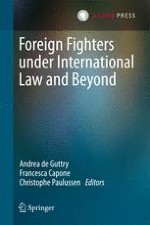2016 | OriginalPaper | Buchkapitel
23. Foreign Fighters and the Deprivation of Nationality: National Practices and International Law Implications
verfasst von : Laura Van Waas
Erschienen in: Foreign Fighters under International Law and Beyond
Verlag: T.M.C. Asser Press
Aktivieren Sie unsere intelligente Suche, um passende Fachinhalte oder Patente zu finden.
Wählen Sie Textabschnitte aus um mit Künstlicher Intelligenz passenden Patente zu finden. powered by
Markieren Sie Textabschnitte, um KI-gestützt weitere passende Inhalte zu finden. powered by
